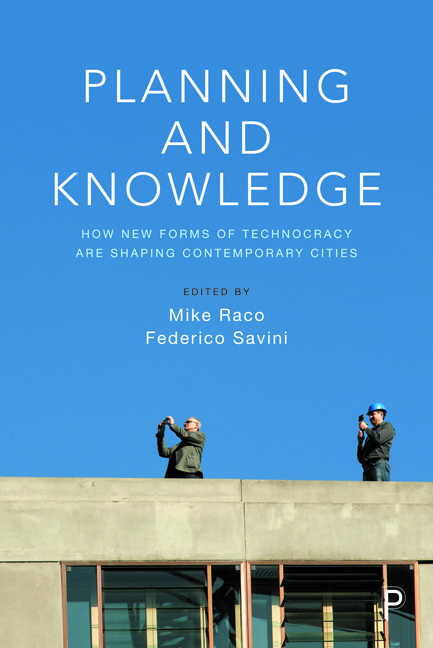Book contents
- Frontmatter
- Contents
- List of figures
- List of tables
- Notes on contributors
- Part I Conceptual framings of technocracy
- Part II Public planning and bureaucracies in contemporary urban development politics
- Part III Corporate knowledge and the land and property development sector
- Part IV Private consultants and the delivery of public policy
- Part V New constellations of actors and the management and governance of contemporary cities
- References
- Index
15 - Smart cities, algorithmic technocracy and new urbantechnocrats
Published online by Cambridge University Press: 30 April 2022
- Frontmatter
- Contents
- List of figures
- List of tables
- Notes on contributors
- Part I Conceptual framings of technocracy
- Part II Public planning and bureaucracies in contemporary urban development politics
- Part III Corporate knowledge and the land and property development sector
- Part IV Private consultants and the delivery of public policy
- Part V New constellations of actors and the management and governance of contemporary cities
- References
- Index
Summary
Introduction
Over the past decade, many cities have adopted policiesand rolled out programmes and projects designed totransform them into a ‘smart city’. It is clear fromthe plethora of initiatives underway globally thatthe idea and ideals of smart cities are quitebroadly conceived, with enterprises ranging fromthose: aimed at changing the nature of urbanregulation and governance through the use ofdata-driven systems that make the city knowable andcontrollable in new, dynamic, reactive ways; todigital systems that improve the efficiency andeffectiveness of city services, increase theeconomic productivity, competitiveness andinnovation of businesses, and drive economic growthand urban development; to ICT-enabled schemes thatenhance environmental sustainability and urbanresilience; to technology-led approaches thatimprove quality of life and promotes acitizen-centric model of development which fosterssocial innovation, civic engagement and socialjustice (Townsend, 2013; Kitchin, 2014).
In all these cases, digital technologies arefront-and-centre as a vital ingredient foraddressing the major issues facing city managers,urban citizens and industry leaders. Digitaltechnologies are seen as a key means of providingsolutions to urban problems (see Table 15.1), bothin terms of instrumental issues such making trafficflow more freely or increasing the efficiency ofservice delivery, but also wider substantive issuessuch as increasing resilience, sustainability, civicparticipation and innovation. Indeed, whatever thechallenge, technology is increasingly beingpositioned and deployed as the optimum means toresolve that challenge, rather than through specificor wider policy initiatives and programmes, politicsand deliberative democracy, or citizeninterventions. In other words, a technocratic,‘solutionist’ approach to running cities is widelybeing adopted (Greenfield, 2013; Kitchin, 2014). Theadoption of smart city technologies, across a rangeof urban domains, are then, we argue in thischapter, at the vanguard of producing a new urbantechnocracy. Accompanying and facilitating thecreation of smart cities and its technocratic ethosand approach is the rise of a new set of urbantechnocrats (for example, chief innovation/technology/ data officers, project managers,consultants, designers, engineers, change-managementcivil servants and academics), supported by a rangeof stakeholders (for example, private industry,lobby groups, philanthropists, politicians, civictech bodies), and events (for example, various smartcity expos, workshops, hackathons) and governancearrangements (for example, smart city advisoryboards).
- Type
- Chapter
- Information
- Planning and KnowledgeHow New Forms of Technocracy Are Shaping Contemporary Cities, pp. 199 - 212Publisher: Bristol University PressPrint publication year: 2019

